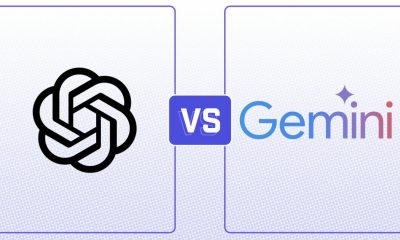Technology
Netflix’s ‘American Vandal’ star says show changed how he uses social media


Tyler Alvarez (left) in season one of ‘American
Vandal’
Netflix
-
Business Insider spoke to Tyler Alvarez, the
20-year-old actor who plays Peter Maldanado, the documentarian
on “American Vandal.” -
Alvarez told us how being on “American Vandal” has made
him rethink the way he uses social media. -
Alvarez, who got into true crime because of the show,
also discussed what other parts of American culture and society
he’d love to see in another season.
“American Vandal” season two dropped on Netflix Friday.
Season two gets even more serious
than season one as it tackles forced confessions, classism within
schools, and (again) the relationship teens have with social
media. But at the same time, it’s about poop.
In season two, documentarians
Peter Maldanado and Sam Ecklund travel from Oceanside, CA, to
Bellevue, WA, to solve the case of The Turd Burglar. The Turd
Burglar is a prankster at St. Bernadine’s Catholic High School
who has committed several poop-related crimes, including
poisoning the cafeteria’s lemonade with laxatives.
Season two is clever, sharp, and
even funnier than the first season. Before season two’s release,
Business Insider spoke to 20-year-old actor Tyler Alvarez, who
plays Peter Maldonado, the high-school documentarian who turned
his classmate’s accusation into a gripping documentary that was
so successful he got to make one in another state.
Alvarez told us about the
challenges of playing a documentarian who is rarely depicted on
camera (save for voiceover), how the show got him obsessed with
true crime, and how being on “American Vandal” has made him
rethink the way he uses social media.
Carrie Wittmer:
What made you want to do this show in particular?
Tyler Alvarez:
What made me want to do it was the satire element. It was very
realistic and not like we we were laughing at it. That’s what
hooked me into it.
Wittmer: Are
there any true-crime documentary series that you really
like?
Alvarez: Oh, my
God. Well, I loved “Making a Murderer.” After booking the show,
they had us watch it. But besides that, I love “Serial.” Oh, my
God. Sarah Koenig is my biggest … Oh, God. I love her to death.
I think she’s freaking brilliant and I’m such a fan. I’m dying to
meet her one day.
Wittmer: So did
the showrunners have everyone watch “Making a Murderer,” and
that’s how you got into true crime?
Alvarez: Yeah.
Well, suggested. And of course, I did my homework.
Wittmer: Season
one pretty deliberately satirizes “Making a Murderer.” So that
definitely makes sense.
Alvarez: I think
that the show, in both seasons, captures the intensity in “Making
a Murderer” and “The Jinx.” But it’s about …
Wittmer:
D**ks and poop?
Alvarez: Yeah.
This time we tackle false confessions. When we were going over
season two, I was watching a bunch of the stuff on “Shadow
Truth,” all the ones with false confessions. It didn’t make sense
to me that people would confess to a crime that they wouldn’t
commit. But after watching those documentaries, I was like, “Oh,
that’s actually a thing.”
Wittmer: Your
role is a little bit more of a challenge than a lot of people
might think, because your character, Peter, is a true
documentarian. So we know he loves films and filmmaking, and
he’s best friends with Sam. But his personality isn’t really
shown in any other ways. Do you have some sort of vision of what
he’s like outside of this documentary he’s making?
Alvarez: 100% I
do. And as much as I would love for us to show more of Peter, it
would break our whole mold of sticking so true to true crime, and
these documentaries that are never about the documentarian. It’s
always about the story they’re telling. If we went into Peter’s
story, then we would kind of become a “show.” And our whole thing
is that we’re not a show, quote unquote. Thinking about him from
the first season, he wasn’t a nerd or anything like that. But he
was a bit of an outcast. He wasn’t really popular, didn’t have
much friends besides Sam. And they would hang out and
whatnot.
Wittmer: Yeah.
And now he has a Netflix deal.
Alvarez: Even in
season one, Peter really kept to himself and stayed under the
radar. But now he feels like he has something to offer to the
world, where before he didn’t really feel noticed.
The
really important
lesson for me and for Peter is that none of this changes you.
Peter felt like he had more to offer as a human being at the end
of season one, because he’d shared this documentary. But Peter
hadn’t changed at all. It taught me that you don’t need anything
to feel good about yourself. I’m trying to find the right words
but pretty much I’m saying that you don’t need anything to be
somebody. Who you are is enough. It’s sort of like me. Before
being an actor and now being an actor, I’m still the same person.
I still am just as valid as I was before I was an actor. Does
that make sense?
Wittmer:
Yes.
Alvarez: I hope
I’m making sense.
Wittmer: You
are. Success can change you, but you were always that person all
along.
Alvarez: Right?
For real, though. For real. It was important for me as an artist
to realize that I’m still the same person underneath that I was
when I first started, and that none of this changes me. And it
doesn’t necessarily give me any more credit or credibility at
all. And you don’t need the credibility. You are enough as you
are.
Wittmer: I
do get a sense from season two that while Peter and Sam are
comfortable and confident, they are still wondering how they even
made this happen. They’re a little more anxious to solve the case
and get it done right and objectively.
Alvarez: There’s
so much work that I have to do as an actor to really sink into
the person that we will never know. There are so many
things about Peter that you guys will never know, but I will
know. It makes him feel real to me and gives him a life that’s
not on the page.
Wittmer: You
said Peter is the same person, but do you think that there’s
anything about him that has changed since he got a Netflix
deal?
Alvarez: Well,
he’s definitely got a lot more money now. He can definitely
afford college, I’ll say that. He’ll be all right for a little
bit. But you know how this business goes. So hopefully Peter will
get another doc.
Wittmer: And
those things that you talked about that you know about Peter,
that will never be in the show, are those things you’ve also
talked to the writers about?
Alvarez: Some
things, yeah. Certain actors, they could tell you everything
about the character: What’s their favorite food, what’s this,
what’s that. And a majority of it’s not even discussed in the
script. It’s just more about adding a life to the character. I do
talk about some things with the directors and stuff like that.
But Peter, outside of documentarian, as a human being outside of
that is up to me.
Wittmer: That’s
fun.
Alvarez: I mean,
it doesn’t matter. Because none of it will ever be talked about.
But that’s one of the most fun parts. That’s where I get my
creative freedom, in a way.
Wittmer: Is
there anything else in true crime that would be something you’d
like to see “American Vandal” satirize in another season?
Alvarez: That’s a good
question. Anything else? I mean, there’s just so much in true
crime to tackle. It might be too big of shoes for Peter to fill,
but government corruption. And maybe the justice system, in terms
of the courts and prisons. Stuff like that. That’s something that
really sticks out to me and something that I would really like to
shine the light on and to satirize in a fun way.
Wittmer: Both of the
seasons explore corruption within schools, but it doesn’t get too
elaborate. How Dylan and Kevin got accused is kind of similar to
bias in the justice system, just very different settings and very
different crimes.
Alvarez: Yeah it
is.
Wittmer: You’re
20, right?
Alvarez: I’m
turning 21 next month. Oh my God! I’m so excited.
Wittmer: So you
grew up with the internet and social media, which is so different
for high schoolers now than it was for you, and very different
from when I was in high school. I got Facebook, I think, my
senior year. I was mostly on MySpace. When I was in college,
Instagram didn’t exist yet. Twitter did, but it was a very
different Twitter. Do you think that “American Vandal” captures
teens and the way they use social media accurately?
Alvarez: Oh,
100%. We especially capture that this season with Jenna Hawthorne
posting cute photos and showing people what you
want
them to see. It’s a false reality of who we
are and what we experience. Because nobody ever puts the bad. You
rarely go on social media and find someone saying, “Oh, I’m upset
today or oh, this crappy thing happened.” It’s mostly like, “Oh,
look at me on this yacht or look at me in this cool store or look
at me on vacation!” We really do capture that precisely. In my
ending monologue in the second season, I’m saying, “Maybe we’re
not the worst generation, we’re just the most exposed.” And I
believe that. Social media creates these expectations. It
enforces social standards and status and things like that that
we’re supposed to live under. But at the same time, our
generation is moving more toward love and acceptance. And I think
that’s something we tackle.
Wittmer: Has the
show influenced how you use social media?
Alvarez: It
has! Because I’m trying to be a lot more honest. I’ll give you an
example: I have a photo that I’m going to post soon that is
cropped from my chest up. I was working out on the beach and my
caption is going to be like, “Don’t let me fool you. I cropped
out my snack pack.” Just posting this photo, it would look like
I’m buff from my waist up. No. I got a little snack pack, hence
why I cropped it all the way up here. You know?
Wittmer:
Absolutely. I think people are starting to want more honesty on
social media, especially Instagram, because these filtered,
perfect lives are getting a bit tired and feel very forced,
because they are.
Alvarez: I want
to be more honest with social media. It’s also really important
to also connect with people and for people to see the real
versions of you. That’s what people are drawn to: things that are
real. And not things that feel like someone told me to post or
something like that.
-

 Entertainment7 days ago
Entertainment7 days agoNASA discovered bacteria that wouldn’t die. Now it’s boosting sunscreen.
-

 Business6 days ago
Business6 days agoTesla drops prices, Meta confirms Llama 3 release, and Apple allows emulators in the App Store
-

 Business5 days ago
Business5 days agoTechCrunch Mobility: Cruise robotaxis return and Ford’s BlueCruise comes under scrutiny
-

 Entertainment6 days ago
Entertainment6 days ago‘The Sympathizer’ review: Park Chan-wook’s Vietnam War spy thriller is TV magic
-

 Business4 days ago
Business4 days agoTesla layoffs hit high performers, some departments slashed, sources say
-

 Business5 days ago
Business5 days agoMeta to close Threads in Turkey to comply with injunction prohibiting data-sharing with Instagram
-

 Entertainment4 days ago
Entertainment4 days agoChatGPT vs. Gemini: Which AI chatbot won our 5-round match?
-

 Business3 days ago
Business3 days agoFormer top SpaceX exec Tom Ochinero sets up new VC firm, filings reveal





















